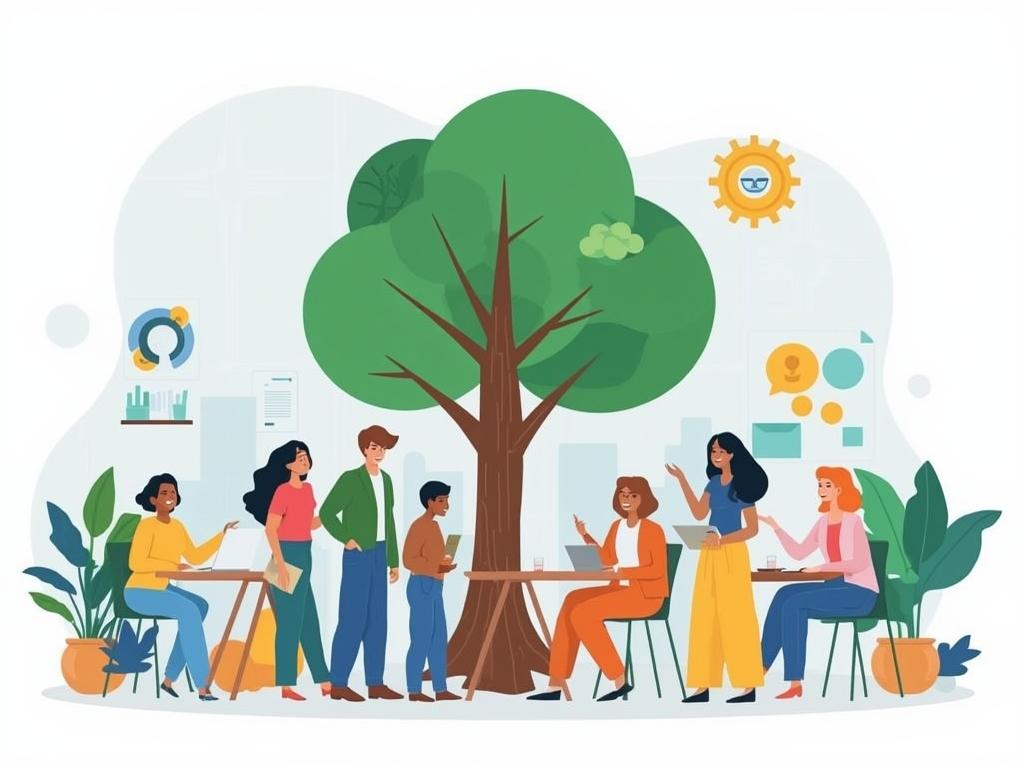The Influence of Generation Z on the Restructuring of Corporate Policies
Who are the protagonists of this transformation?
Generation Z, made up of young people born between the mid-1990s and the early 2010s, is redefining the rules of the game in the job market. Unlike previous generations, these professionals grew up in a hyper-connected world, where technology is not a differentiator, but an extension of everyday life. They not only demand change, but implement it with a disruptive mindset.
Companies that once prioritized rigid hierarchies and long working hours are now forced to rethink their structures. Generation Z values flexibility, o purpose and transparency than high salaries or traditional benefits. But why have these characteristics become so important? The answer lies in the way this generation sees the balance between personal and professional life.
A study by [Deloitte](https://www2.deloitte.com/) reveals that 49% of Generation Z young people choose jobs in line with their personal values. This means that companies that don't demonstrate a commitment to social causes, diversity or sustainability could lose out on valuable talent. Have you ever stopped to think about how your organization is adapting to this new reality?
What's more, this generation is not afraid to question the status quo. They are looking for environments where they can grow, learn and contribute in a meaningful way. If a stable job was once the dream of many, today professional fulfillment is linked to the possibility of making a difference.
Flexibility: The End of the 9am to 6pm Model
The concept of working from 9 a.m. to 6 p.m. is becoming obsolete, and Generation Z is one of the main people responsible for this change. For these young people, productivity doesn't mean spending hours stuck in an officebut have the freedom to manage their own time. Companies that adopt flexible working hours or hybrid models are reaping the rewards of this mentality.
A practical example is the case of Spotify, which has implemented a program called "Work From Anywhere". Employees can choose where and when they work, as long as they meet their targets. The result? Increased employee satisfaction and talent retention. Is your company ready to embrace this trend?
Advertising
In addition to the home office, Generation Z also values the possibility of working on a variety of projects and taking on different roles within the organization. They don't want to be locked into a single task, but want to explore their multiple skills. This requires companies to create more dynamic structures, with less bureaucracy and more autonomy.
Of course, this transition is not simple. Many managers still believe that rigid control guarantees better results. However, research shows that employees with greater freedom tend to be more creative and engaged. The challenge, then, is to find a balance between flexibility and responsibility.
Purpose: More than a Salary, a Cause
If there's one word that defines Generation Z's expectations in the job market, it's purpose. These young people aren't willing to dedicate their lives to companies that only aim to make a profit. They want to be part of organizations that have a positive impact on society.
Companies like Patagonia are clear examples of this. The brand not only sells clothes, but also leads environmental initiatives, such as donating 1% of its sales to ecological causes. This resonates deeply with Generation Z, who prefer brands aligned with their values.
But how do you implement purpose in a traditional corporation? The first step is to listen to employees. Many companies make the mistake of creating social responsibility policies without involving their teams. Generation Z wants to actively participate in these decisions, contributing ideas and feedback.
Another crucial point is authenticity. There's no point in launching diversity campaigns if, internally, the corporate culture is still exclusionary. Transparency and consistency are essential to win the trust of these young professionals.
Transparency: The Demand for Honest Relationships
Generation Z grew up in an age of instant information, where fake news and corporate scandals are frequently exposed. That's why they value companies that practice transparency at all levels, from internal communication to strategic decisions.
An interesting example is that of BufferA social media company that publicly discloses the salaries of all its employees. This practice, which could be considered risky, actually strengthens trust and reduces inequalities. Would your company be willing to adopt such radical measures?
In addition to salary transparency, young professionals expect clarity about career growth, constant feedback and access to the organization's goals. They don't want to be surprised by mass layoffs or sudden changes in strategy.
For companies, this means abandoning the culture of secrecy and embracing more open communication. Platforms such as [Glassdoor](https://www.glassdoor.com.br/) show that employees are increasingly willing to share their experiences - whether positive or negative. Ignoring this trend can be costly in terms of reputation and attracting talent.

Technology and Innovation: Tools for a New Working Model
Generation Z doesn't just use technology - it demands that companies integrate it intelligently. From online selection processes to remote collaboration platforms, digitalization is a minimum requirement to attract these professionals.
Tools such as Slack, Trello It is Zoom are already commonplace in many companies, but Generation Z goes further. They expect artificial intelligence, automation and data analysis to be part of everyday life. After all, why spend hours on repetitive tasks when software can solve them in minutes?
However, technology alone is not enough. You need to invest in training and constant updates. A common mistake is to adopt new tools without training teams, leading to frustration and resistance. How is your company preparing its employees for this evolution?
Another important point is digital security. With the growing concern about data leaks, organizations need to ensure that their platforms are reliable. Generation Z, accustomed to dealing with online privacy, will not tolerate failures in this regard.
Diversity and Inclusion: Not Just a Difference, but a Necessity
For Generation Z, diversity is not an optional topic - it's a requirement. They seek environments where people from different backgrounds, genders, sexual orientations and cultures are truly valued. Companies that ignore this demand are falling behind.
An emblematic case is that of Microsoft, which has invested heavily in inclusion programs, from recruitment to career development. The company believes that diverse teams are more creative and innovative. Is your organization following this path?
But diversity goes beyond numbers. You need to create a culture where everyone feels heard and respected. This includes anti-harassment policies, training on unconscious biases and safe spaces for discussions.
In addition, Generation Z expects companies to take a public stance on social issues. Standing on the fence is no longer an option. Silence is often interpreted as complicity.
The Future of Work: What to Expect in the Next Few Years?
The influence of Generation Z is only set to grow, and companies that fail to adapt run the risk of becoming irrelevant. The future of work will be shaped by three pillars: flexibility, purpose and transparency.
But how do you prepare for this change? The first step is to listen to younger employees. They are the bridge to understanding emerging demands. Then you need to review internal policies, from benefits to management models.
Another crucial aspect is adaptive leadership. Authoritarian managers are losing ground to leaders who inspire, mentor and collaborate. Are you willing to rethink your management style?
Finally, it is essential to remember that this transformation is not a threat, but an opportunity. Companies that embrace change are building teams that are more engaged, innovative and prepared for the challenges of the future. Is yours in that group?
Conclusion: The Time to Act is Now
Generation Z is rewriting the rules of the job market, and there's no going back. Flexibility, purpose and transparency are no longer trends - they are requirements. Ignoring this reality means losing talent, customers and relevance.
But the good news is that any company, regardless of size or sector, can begin this journey. Small changes, such as flexible working hours or diversity programs, can make a difference. The important thing is to take the first step.
What are you going to do today to adapt to this new era? The future of work has already begun, and it belongs to those who dare to evolve.



